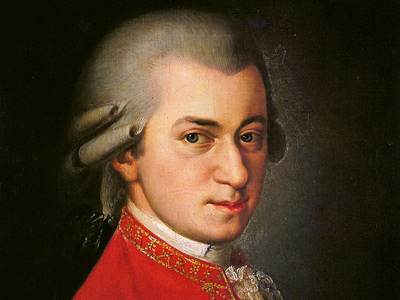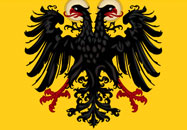Wolfgang Amadeus Mozart (1756-1791)
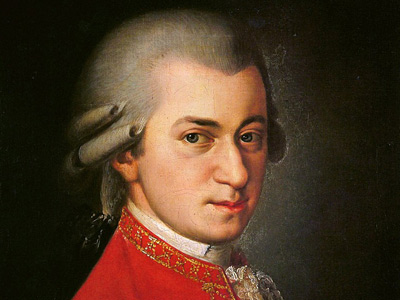
1762–73: Travel
While Wolfgang was young, his family made several European journeys in which he and Nannerl performed as child prodigies. These began with an exhibition in 1762 at the court of Prince-elector Maximilian III of Bavaria in Munich, and at the Imperial Courts in Vienna and Prague. A long concert tour followed, spanning three and a half years, taking the family to the courts of Munich, Mannheim, Paris, London, The Hague, again to Paris France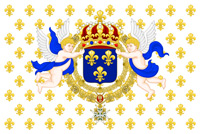 The Kingdom of France is the historiographical name or umbrella term given to various political entities of France in the medieval and early modern period. It was one of the most powerful states in Europe since the High Middle Ages. It was also an early colonial power, with possessions around the world. Colonial conflicts with Great Britain led to the loss of much of its North American holdings by 1763. The Kingdom of France adopted a written constitution in 1791, but the Kingdom was abolished a year later and replaced with the First French Republic., and back home via Zurich, Donaueschingen, and Munich. During this trip, Wolfgang met a number of musicians and acquainted himself with the works of other composers. A particularly important influence was Johann Christian Bach, whom he visited in London England
The Kingdom of France is the historiographical name or umbrella term given to various political entities of France in the medieval and early modern period. It was one of the most powerful states in Europe since the High Middle Ages. It was also an early colonial power, with possessions around the world. Colonial conflicts with Great Britain led to the loss of much of its North American holdings by 1763. The Kingdom of France adopted a written constitution in 1791, but the Kingdom was abolished a year later and replaced with the First French Republic., and back home via Zurich, Donaueschingen, and Munich. During this trip, Wolfgang met a number of musicians and acquainted himself with the works of other composers. A particularly important influence was Johann Christian Bach, whom he visited in London England The Kingdom of Great Britain was a sovereign country in Western Europe from 1 May 1707 to the end of 31 December 1800. The state was created by the 1706 Treaty of Union and ratified by the Acts of Union 1707, which united the kingdoms of England (which included Wales) and Scotland to form a single kingdom encompassing the whole island of Great Britain and its outlying islands, with the exception of the Isle of Man and the Channel Islands. in 1764 and 1765. The family again went to Vienna in late 1767 and remained there until December 1768.
The Kingdom of Great Britain was a sovereign country in Western Europe from 1 May 1707 to the end of 31 December 1800. The state was created by the 1706 Treaty of Union and ratified by the Acts of Union 1707, which united the kingdoms of England (which included Wales) and Scotland to form a single kingdom encompassing the whole island of Great Britain and its outlying islands, with the exception of the Isle of Man and the Channel Islands. in 1764 and 1765. The family again went to Vienna in late 1767 and remained there until December 1768.
Mozart wrote his first symphony when he was eight years old. It is probable that his father transcribed most of it for him.
The family trips were often difficult, and travel conditions were primitive. They had to wait for invitations and reimbursement from the nobility, and they endured long, near-fatal illnesses far from home: first Leopold (London, summer 1764), then both children (The Hague, autumn 1765).
After one year in Salzburg, Leopold and Wolfgang set off for Italy, leaving Anna Maria and Nannerl at home. This tour lasted from December 1769 to March 1771. As with earlier journeys, Leopold wanted to display his son's abilities as a performer and a rapidly maturing composer. Wolfgang met Josef Mysliveček and Giovanni Battista Martini in Bologna, and was accepted as a member of the famous Accademia Filarmonica. In Rome, he heard Gregorio Allegri's Miserere twice in performance, in the Sistine Chapel, and wrote it out from memory, thus producing the first unauthorized copy of this closely guarded property of the Vatican.
In Milan, Mozart wrote the opera Mitridate, re di Ponto (1770), which was performed with success. This led to further opera commissions. He returned with his father twice to Milan (August–December 1771; October 1772 – March 1773) for the composition and premieres of Ascanio in Alba (1771) and Lucio Silla (1772). Leopold hoped that these visits would result in a professional appointment for his son, and indeed ruling Archduke Ferdinand contemplated hiring Mozart but owing to his mother Empress Maria Theresa's reluctance to employ "useless people", the matter was dropped and Leopold's hopes were never realized.
Toward the end of the final Italian journey, Mozart wrote the first of his works to be still widely performed today, the solo motet Exsultate, jubilate, K. 165.
HISTORY
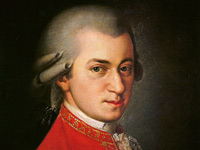
RESOURCES
This article uses material from the Wikipedia article "Wolfgang Amadeus Mozart", which is released under the Creative Commons Attribution-Share-Alike License 3.0.
© Stories Preschool. All Rights Reserved.
